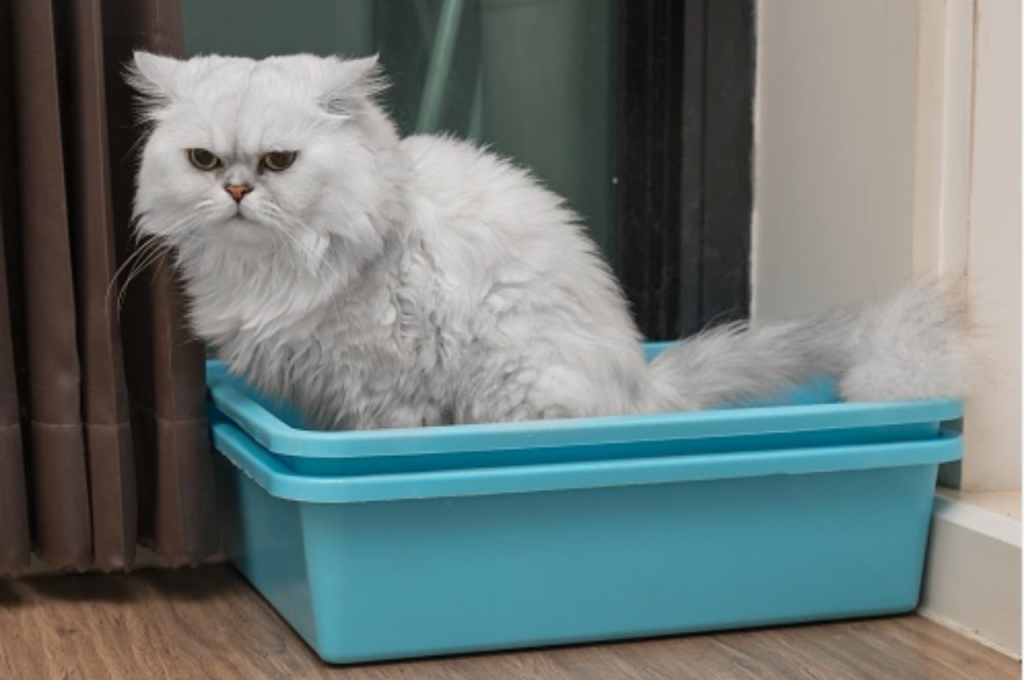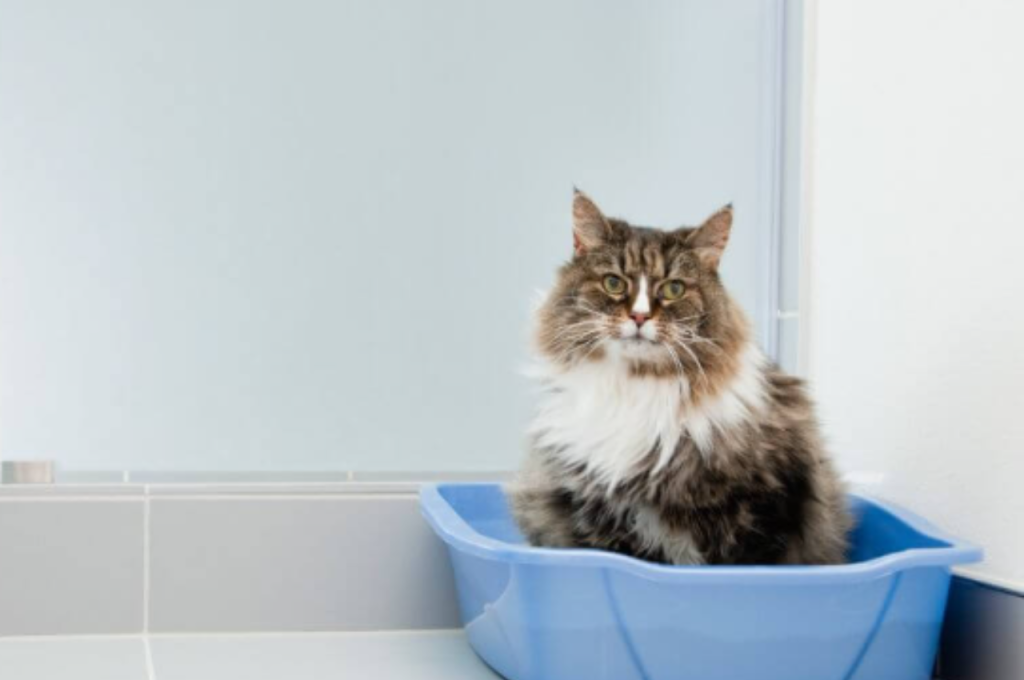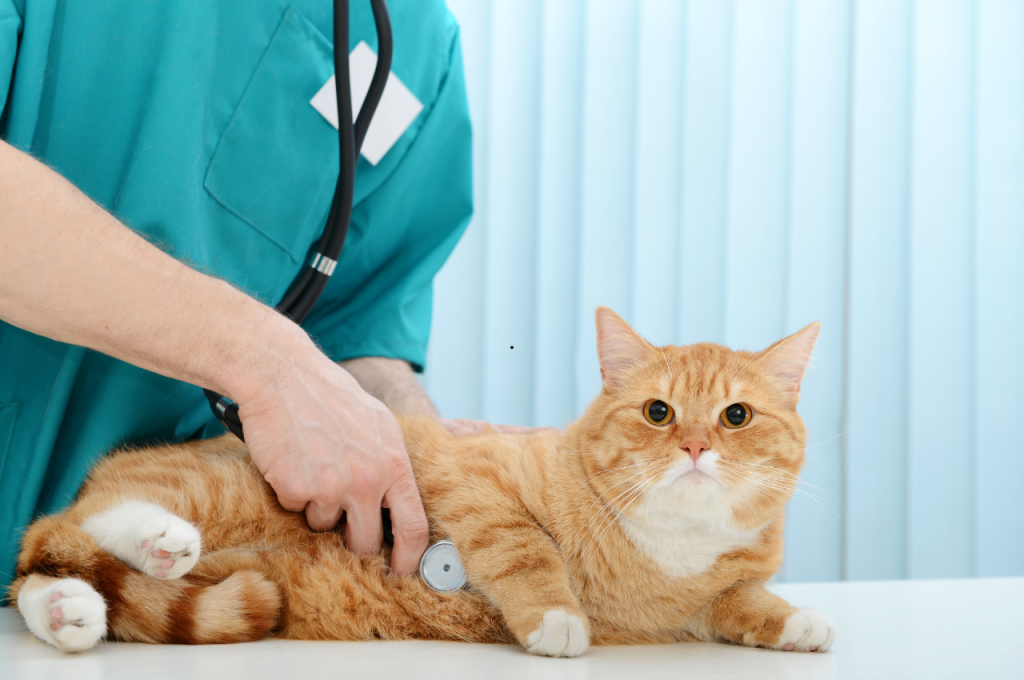To help a constipated cat naturally, you can try adding fiber to their diet and ensuring they stay hydrated. This can be done by incorporating high-fiber foods such as canned pumpkin or bran into their meals, and providing plenty of fresh water for them to drink.
Additionally, regular exercise can help stimulate their digestive system and promote regular bowel movements. By following these simple steps, you can provide natural relief for your constipated cat and improve their overall well-being.
Recognizing Constipation in Cats
Recognizing constipation in cats can be challenging, but there are natural ways to help your furry friend. Increase their water intake and offer wet food to add moisture. Adding fiber to their diet and encouraging exercise can also aid in relieving constipation.

Signs and Symptoms
When it comes to recognizing constipation in cats, it’s important to know the signs and symptoms. Some of the most common signs of constipation in cats include:
- Infrequent bowel movements
- Straining while attempting to defecate
- Dry, hard stools
- Pain or discomfort while defecating
- Lethargy or lack of appetite
- Vomiting
If you notice any of these symptoms in your cat, it’s important to take action right away.
Dietary Adjustments for Constipated Cats
Help your constipated cat naturally by making dietary adjustments. Increase their water intake and feed them high-fiber foods like pumpkin or specialized cat foods to promote regular bowel movements. Avoid dry food and consider adding probiotics to their diet to support their digestive health.
High-fiber Foods
One effective way to help relieve constipation in cats is to make dietary adjustments. A key element of a cat’s diet to combat constipation is high-fiber foods. Fiber helps regulate bowel movements and aids in the passage of stool. By adding fiber-rich foods to your cat’s diet, you can help soften their stool and alleviate constipation.
Here are some examples of high-fiber foods that you can incorporate into your cat’s meals:
- Pumpkin: Rich in fiber and water content, pumpkin can help promote regular bowel movements. You can offer your cat plain, canned pumpkin (not pumpkin pie filling) in small portions.
- Oat bran: This grain is high in soluble fiber, which helps add bulk to the stool. You can sprinkle a small amount of oat bran over your cat’s food.
- Psyllium husk: Psyllium husk is a natural laxative that can soften the stool and improve bowel movements. It is available in powder or capsule form, and you can mix a small amount into your cat’s food.
Remember to introduce these high-fiber foods gradually into your cat’s diet, as sudden changes can upset their stomach. Monitor their response to the new additions and adjust the amounts accordingly.
Importance of Hydration
In addition to incorporating high-fiber foods, ensuring that your constipated cat stays hydrated is crucial. Hydration plays a vital role in maintaining healthy bowel movements and preventing constipation.
Here are some tips to encourage your cat to drink more water:
- Provide fresh water: Make sure your cat always has access to clean, fresh water. Consider using a water fountain as some cats prefer running water.
- Wet food: Feeding your cat wet food can increase their overall water intake. Canned cat food typically has a higher water content compared to dry kibble.
- Add water to meals: You can add a small amount of water to your cat’s food to increase its moisture content. This can be especially helpful for cats who are reluctant to drink water.
Encouraging proper hydration is essential for maintaining your cat’s overall health and preventing constipation. Monitor their water intake and consult with your veterinarian if you notice any significant changes or concerns.
The Role of Probiotics and Prebiotics
Introducing probiotics and prebiotics can aid in naturally relieving constipation in cats. These supplements promote a healthy gut flora, aiding digestion and regular bowel movements for your furry friend. Incorporating these natural remedies can help alleviate constipation in cats effectively.
If you have a constipated cat, it’s important to know that there are natural ways to help them. One of the most effective methods is through the use of probiotics and prebiotics. Probiotics are live bacteria that help support a healthy gut, while prebiotics are a type of dietary fiber that feeds the good bacteria in the gut. Incorporating both of these into your cat’s diet can have a significant impact on their digestive health.
Benefits of Probiotics
Probiotics have many benefits for cats, including aiding in digestion and reducing inflammation in the gut. They can also help prevent and treat diarrhea, as well as improve the immune system. By introducing probiotics into your cat’s diet, you can help balance the bacteria in their gut and promote overall digestive health.

Incorporating Prebiotics
Prebiotics are just as important as probiotics when it comes to supporting a healthy gut. They work by providing the good bacteria in the gut with the food they need to thrive. Some common sources of prebiotics include chicory root, Jerusalem artichoke, and bananas. By incorporating these foods into your cat’s diet, you can help ensure that they have a healthy balance of bacteria in their gut.
Probiotics and prebiotics can play a crucial role in helping to relieve constipation in cats. By promoting a healthy gut and balanced bacteria, you can improve your cat’s overall digestive health and prevent future episodes of constipation. Remember to always consult with your veterinarian before making any changes to your cat’s diet.
Home Remedies for Feline Constipation
Assist your constipated feline friend with natural remedies such as adding fiber to their diet, providing plenty of water, and massaging their abdomen. Other options include pumpkin, olive oil, and probiotics to help alleviate discomfort and promote healthy bowel movements.
Pumpkin Puree
Pumpkin puree is a natural remedy to help a constipated cat. Rich in fiber, it can aid digestion and relieve constipation. Add a small spoonful to your cat’s food to promote regular bowel movements.
Olive Oil: Pros and Cons
Feline constipation can be distressing for both cats and their owners. However, there are effective home remedies that can help alleviate this issue naturally.
- High in fiber to aid digestion
- Feed a teaspoon per day to your cat
- Ensure it’s plain, not spiced pumpkin
- Pros: Lubricates the digestive tract
- Cons: High-fat content, use sparingly
Physical Activity and Constipation Relief
When it comes to relieving constipation in cats, physical activity plays a crucial role in promoting healthy digestion and bowel movements. Engaging your feline friend in regular exercise not only helps prevent constipation but also provides a natural and enjoyable way to alleviate existing discomfort. By encouraging physical activity, you can effectively support your cat’s digestive health and overall well-being.
Exercise Ideas
Interactive play is a fantastic way to get your cat moving and facilitate the natural flow of their digestive system. Incorporating various exercise ideas into your cat’s routine can significantly reduce the likelihood of constipation and aid in providing relief if they are already experiencing discomfort.
Interactive Play
Engaging your cat in interactive play can include activities such as using feather wands, laser pointers, or interactive toys that encourage them to jump, pounce, and move around. These types of engaging play sessions help stimulate their muscles and promote regular bowel movements, reducing the risk of constipation.
Litter Box Habits and Constipation
If your cat is experiencing constipation, there are natural ways to help them. Encourage hydration by providing fresh water and incorporating fiber-rich foods into their diet. Regular exercise and a stress-free environment can also promote healthy litter box habits.
Cats are meticulous creatures when it comes to their litter box habits. Cleanliness, Location, and Accessibility are crucial factors that can impact their comfort and regularity. Ensuring a cat’s environment is conducive to healthy elimination can help prevent and alleviate constipation.
Cleanliness
Regular cleaning of the litter box is vital. Cats are more likely to use a clean litter box, and clumping litter makes it easier to remove waste. Scooping waste at least once a day and changing the litter every 1-2 weeks can promote regular elimination.
Location and Accessibility
The placement of the litter box is essential. It should be easily accessible and located in a quiet area away from heavy foot traffic. Multiple boxes in different areas of the home can provide convenience and reduce stress for the cat.
Alternative Therapies for Constipated Cats
When it comes to alternative therapies for constipated cats, there are several natural methods that can help alleviate their discomfort. These alternative treatments are gentle, non-invasive, and can provide relief for cats experiencing constipation.
Acupressure
Acupressure is a traditional Chinese medicine technique that involves applying gentle pressure to specific points on the cat’s body to stimulate natural healing and alleviate constipation. By targeting the acupressure points associated with the digestive system, this therapy can help promote bowel movements and relieve constipation.
Gentle Massage Techniques
Gentle massage techniques can help stimulate the cat’s digestive system and promote bowel movements. By using gentle circular motions on the cat’s abdomen, you can help alleviate constipation and provide relief for your furry friend. Massaging the cat’s lower back and hindquarters can also help relax the muscles and encourage natural bowel movements.
When to Consult a Vet
If your cat is constipated, there are a number of things you can do to help alleviate their discomfort. However, it’s important to know when it’s time to consult a vet. If your cat has been constipated for more than 48 hours, or if they are experiencing severe discomfort or pain, it’s time to seek professional help. In addition, if your cat has a history of constipation or other digestive issues, it’s a good idea to consult with your vet to develop a long-term plan for managing their symptoms.
In conclusion, recognizing constipation in cats is essential to helping your furry friend feel better. By paying attention to the signs and symptoms, you can take action to help your cat find relief from their discomfort. Remember, if you’re unsure about what to do, don’t hesitate to consult with your vet.
Preventing Future Episodes
To prevent future episodes of constipation in cats, it’s important to incorporate natural remedies into their diet. This can include adding fiber-rich foods, such as pumpkin or sweet potato, to their meals, as well as increasing their water intake through wet food or a water fountain. Regular exercise and grooming can also help promote healthy bowel movements for your feline friend.
Regular Vet Check-ups
Regular vet check-ups are crucial for preventing future episodes of constipation in your cat. Scheduling routine visits with your veterinarian allows for early detection of any underlying health issues that could contribute to constipation. Your vet can provide guidance on the best preventive measures and monitor your cat’s overall health to ensure any potential issues are addressed promptly.

Long-term Diet Management
Implementing a long-term diet management plan is essential for preventing future episodes of constipation in your cat. Consult your veterinarian to determine the most suitable diet for your cat’s specific needs. This may involve incorporating high-fiber foods, ensuring adequate hydration, and potentially supplementing with probiotics. A balanced and nutritious diet can help regulate your cat’s digestive system and minimize the risk of constipation.
Conclusion
Keep your cat comfortable and healthy by trying natural remedies for constipation. Remember, hydration, dietary fiber, and regular exercise are key. Consulting your vet for guidance is crucial for your cat’s well-being. By showing care and attention, you can help your feline friend overcome constipation naturally.
